Psychological Therapy for Smoking Cessation
VerifiedAdded on 2023/04/23
|7
|1413
|408
AI Summary
This article discusses the effectiveness of psychological therapy for smoking cessation. It highlights the importance of group therapy and positive psychotherapy in helping smokers quit. Various studies have shown that psychological interventions are more effective than conventional therapies.
Contribute Materials
Your contribution can guide someone’s learning journey. Share your
documents today.
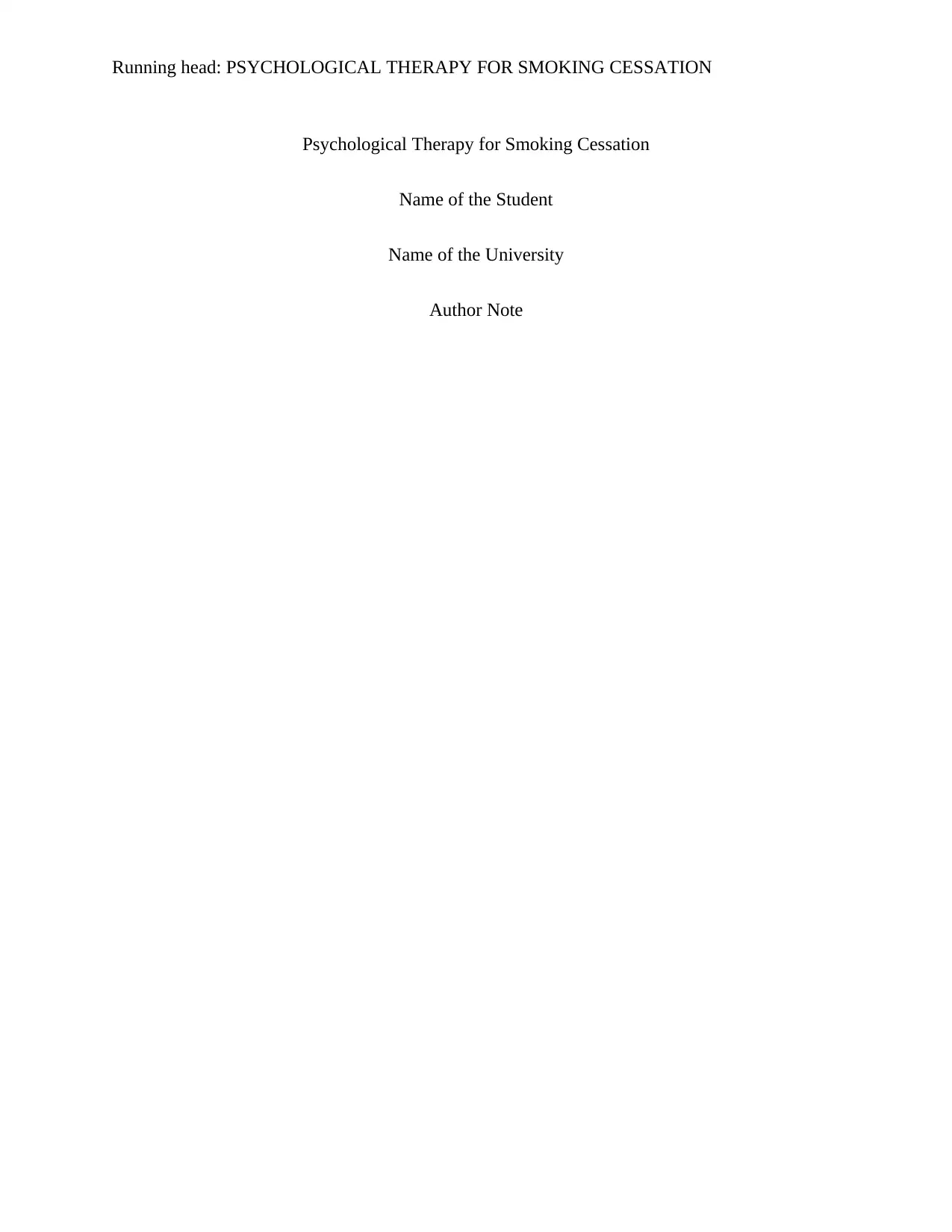
Running head: PSYCHOLOGICAL THERAPY FOR SMOKING CESSATION
Psychological Therapy for Smoking Cessation
Name of the Student
Name of the University
Author Note
Psychological Therapy for Smoking Cessation
Name of the Student
Name of the University
Author Note
Secure Best Marks with AI Grader
Need help grading? Try our AI Grader for instant feedback on your assignments.
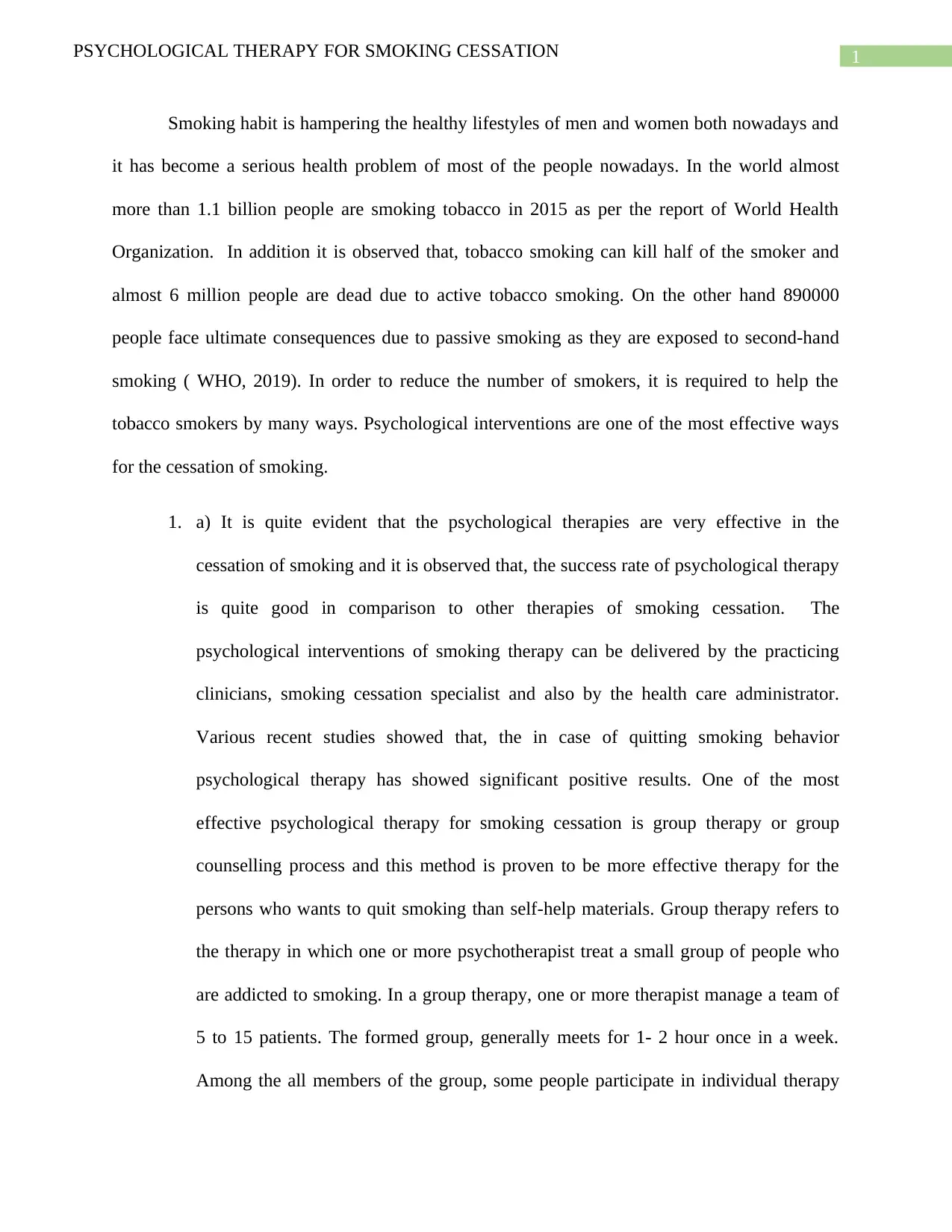
1PSYCHOLOGICAL THERAPY FOR SMOKING CESSATION
Smoking habit is hampering the healthy lifestyles of men and women both nowadays and
it has become a serious health problem of most of the people nowadays. In the world almost
more than 1.1 billion people are smoking tobacco in 2015 as per the report of World Health
Organization. In addition it is observed that, tobacco smoking can kill half of the smoker and
almost 6 million people are dead due to active tobacco smoking. On the other hand 890000
people face ultimate consequences due to passive smoking as they are exposed to second-hand
smoking ( WHO, 2019). In order to reduce the number of smokers, it is required to help the
tobacco smokers by many ways. Psychological interventions are one of the most effective ways
for the cessation of smoking.
1. a) It is quite evident that the psychological therapies are very effective in the
cessation of smoking and it is observed that, the success rate of psychological therapy
is quite good in comparison to other therapies of smoking cessation. The
psychological interventions of smoking therapy can be delivered by the practicing
clinicians, smoking cessation specialist and also by the health care administrator.
Various recent studies showed that, the in case of quitting smoking behavior
psychological therapy has showed significant positive results. One of the most
effective psychological therapy for smoking cessation is group therapy or group
counselling process and this method is proven to be more effective therapy for the
persons who wants to quit smoking than self-help materials. Group therapy refers to
the therapy in which one or more psychotherapist treat a small group of people who
are addicted to smoking. In a group therapy, one or more therapist manage a team of
5 to 15 patients. The formed group, generally meets for 1- 2 hour once in a week.
Among the all members of the group, some people participate in individual therapy
Smoking habit is hampering the healthy lifestyles of men and women both nowadays and
it has become a serious health problem of most of the people nowadays. In the world almost
more than 1.1 billion people are smoking tobacco in 2015 as per the report of World Health
Organization. In addition it is observed that, tobacco smoking can kill half of the smoker and
almost 6 million people are dead due to active tobacco smoking. On the other hand 890000
people face ultimate consequences due to passive smoking as they are exposed to second-hand
smoking ( WHO, 2019). In order to reduce the number of smokers, it is required to help the
tobacco smokers by many ways. Psychological interventions are one of the most effective ways
for the cessation of smoking.
1. a) It is quite evident that the psychological therapies are very effective in the
cessation of smoking and it is observed that, the success rate of psychological therapy
is quite good in comparison to other therapies of smoking cessation. The
psychological interventions of smoking therapy can be delivered by the practicing
clinicians, smoking cessation specialist and also by the health care administrator.
Various recent studies showed that, the in case of quitting smoking behavior
psychological therapy has showed significant positive results. One of the most
effective psychological therapy for smoking cessation is group therapy or group
counselling process and this method is proven to be more effective therapy for the
persons who wants to quit smoking than self-help materials. Group therapy refers to
the therapy in which one or more psychotherapist treat a small group of people who
are addicted to smoking. In a group therapy, one or more therapist manage a team of
5 to 15 patients. The formed group, generally meets for 1- 2 hour once in a week.
Among the all members of the group, some people participate in individual therapy
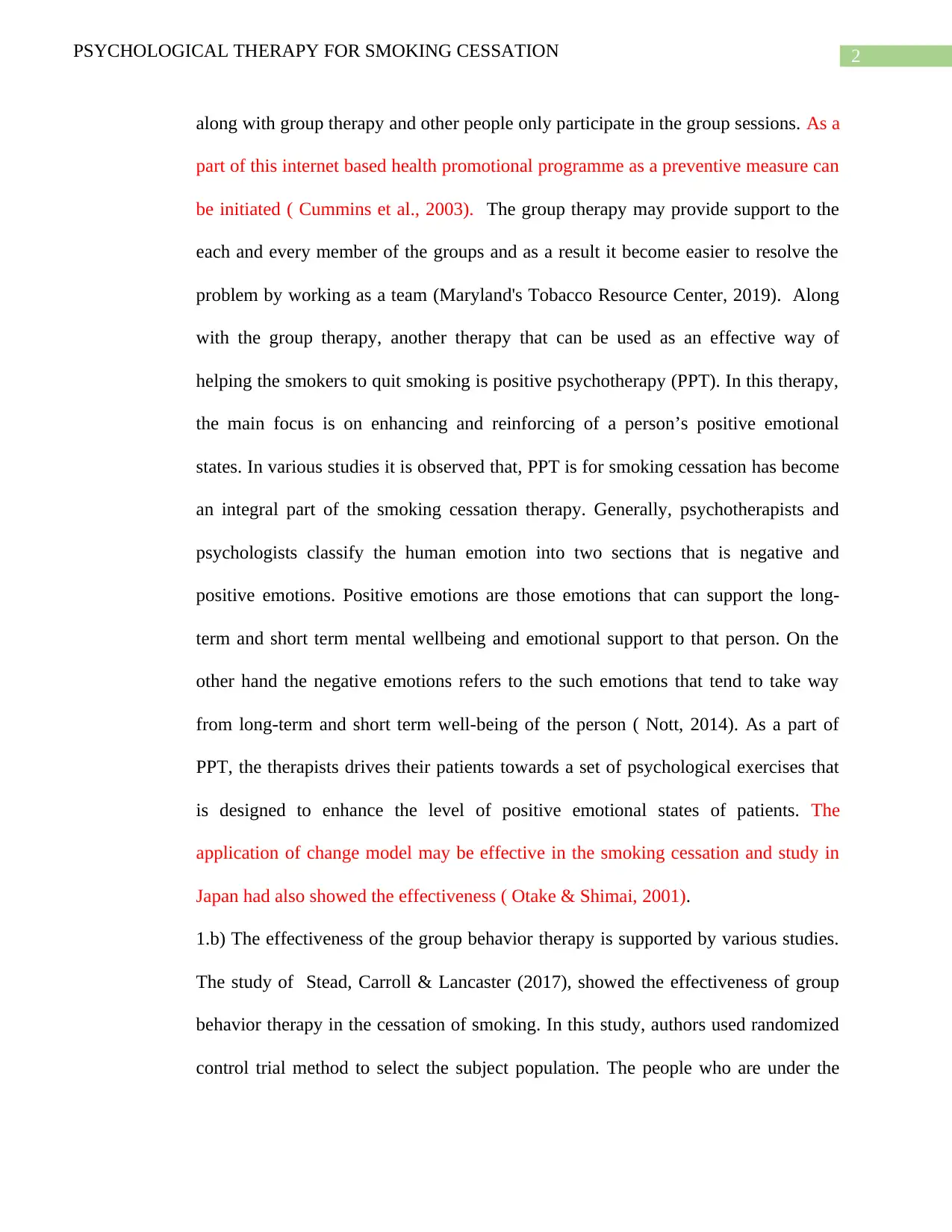
2PSYCHOLOGICAL THERAPY FOR SMOKING CESSATION
along with group therapy and other people only participate in the group sessions. As a
part of this internet based health promotional programme as a preventive measure can
be initiated ( Cummins et al., 2003). The group therapy may provide support to the
each and every member of the groups and as a result it become easier to resolve the
problem by working as a team (Maryland's Tobacco Resource Center, 2019). Along
with the group therapy, another therapy that can be used as an effective way of
helping the smokers to quit smoking is positive psychotherapy (PPT). In this therapy,
the main focus is on enhancing and reinforcing of a person’s positive emotional
states. In various studies it is observed that, PPT is for smoking cessation has become
an integral part of the smoking cessation therapy. Generally, psychotherapists and
psychologists classify the human emotion into two sections that is negative and
positive emotions. Positive emotions are those emotions that can support the long-
term and short term mental wellbeing and emotional support to that person. On the
other hand the negative emotions refers to the such emotions that tend to take way
from long-term and short term well-being of the person ( Nott, 2014). As a part of
PPT, the therapists drives their patients towards a set of psychological exercises that
is designed to enhance the level of positive emotional states of patients. The
application of change model may be effective in the smoking cessation and study in
Japan had also showed the effectiveness ( Otake & Shimai, 2001).
1.b) The effectiveness of the group behavior therapy is supported by various studies.
The study of Stead, Carroll & Lancaster (2017), showed the effectiveness of group
behavior therapy in the cessation of smoking. In this study, authors used randomized
control trial method to select the subject population. The people who are under the
along with group therapy and other people only participate in the group sessions. As a
part of this internet based health promotional programme as a preventive measure can
be initiated ( Cummins et al., 2003). The group therapy may provide support to the
each and every member of the groups and as a result it become easier to resolve the
problem by working as a team (Maryland's Tobacco Resource Center, 2019). Along
with the group therapy, another therapy that can be used as an effective way of
helping the smokers to quit smoking is positive psychotherapy (PPT). In this therapy,
the main focus is on enhancing and reinforcing of a person’s positive emotional
states. In various studies it is observed that, PPT is for smoking cessation has become
an integral part of the smoking cessation therapy. Generally, psychotherapists and
psychologists classify the human emotion into two sections that is negative and
positive emotions. Positive emotions are those emotions that can support the long-
term and short term mental wellbeing and emotional support to that person. On the
other hand the negative emotions refers to the such emotions that tend to take way
from long-term and short term well-being of the person ( Nott, 2014). As a part of
PPT, the therapists drives their patients towards a set of psychological exercises that
is designed to enhance the level of positive emotional states of patients. The
application of change model may be effective in the smoking cessation and study in
Japan had also showed the effectiveness ( Otake & Shimai, 2001).
1.b) The effectiveness of the group behavior therapy is supported by various studies.
The study of Stead, Carroll & Lancaster (2017), showed the effectiveness of group
behavior therapy in the cessation of smoking. In this study, authors used randomized
control trial method to select the subject population. The people who are under the
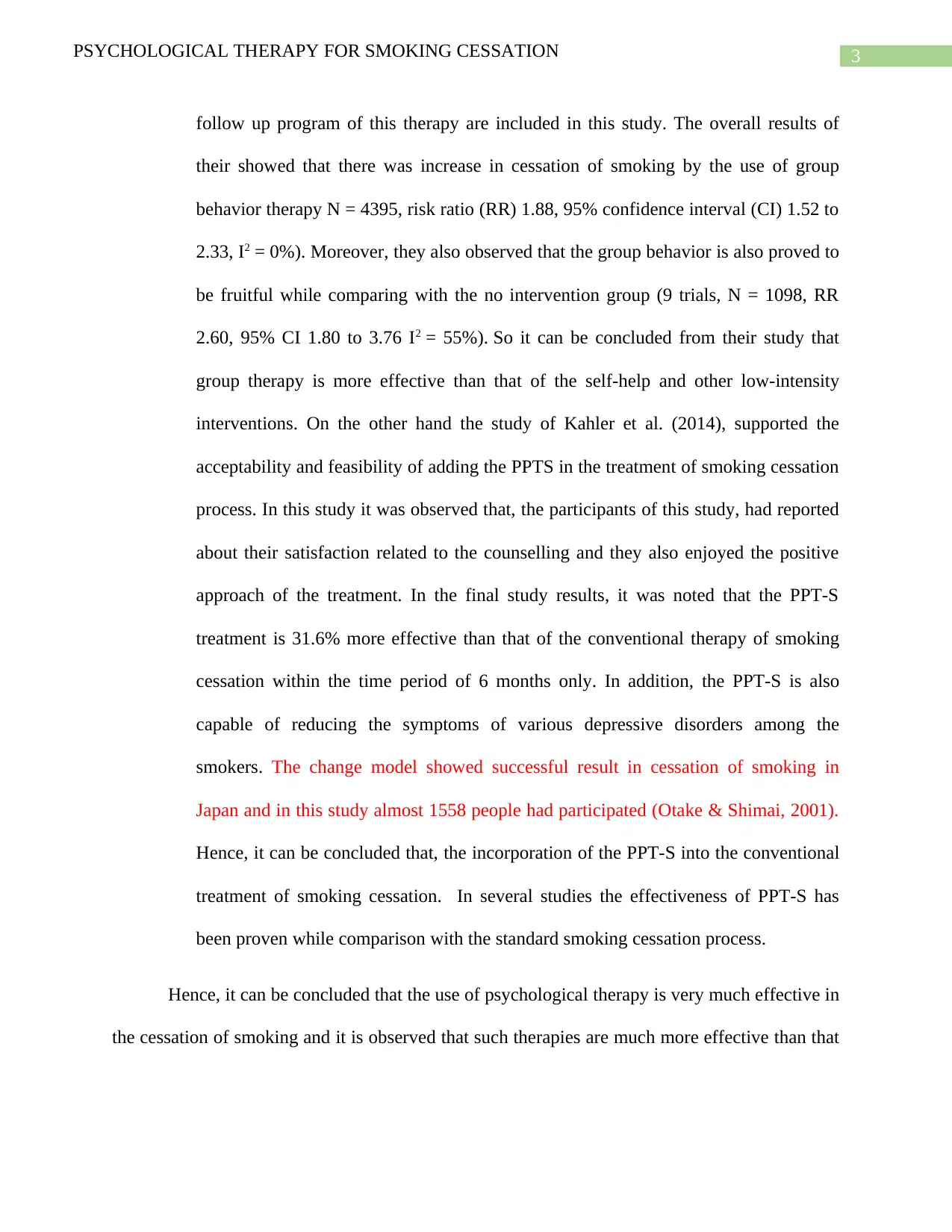
3PSYCHOLOGICAL THERAPY FOR SMOKING CESSATION
follow up program of this therapy are included in this study. The overall results of
their showed that there was increase in cessation of smoking by the use of group
behavior therapy N = 4395, risk ratio (RR) 1.88, 95% confidence interval (CI) 1.52 to
2.33, I2 = 0%). Moreover, they also observed that the group behavior is also proved to
be fruitful while comparing with the no intervention group (9 trials, N = 1098, RR
2.60, 95% CI 1.80 to 3.76 I2 = 55%). So it can be concluded from their study that
group therapy is more effective than that of the self-help and other low-intensity
interventions. On the other hand the study of Kahler et al. (2014), supported the
acceptability and feasibility of adding the PPTS in the treatment of smoking cessation
process. In this study it was observed that, the participants of this study, had reported
about their satisfaction related to the counselling and they also enjoyed the positive
approach of the treatment. In the final study results, it was noted that the PPT-S
treatment is 31.6% more effective than that of the conventional therapy of smoking
cessation within the time period of 6 months only. In addition, the PPT-S is also
capable of reducing the symptoms of various depressive disorders among the
smokers. The change model showed successful result in cessation of smoking in
Japan and in this study almost 1558 people had participated (Otake & Shimai, 2001).
Hence, it can be concluded that, the incorporation of the PPT-S into the conventional
treatment of smoking cessation. In several studies the effectiveness of PPT-S has
been proven while comparison with the standard smoking cessation process.
Hence, it can be concluded that the use of psychological therapy is very much effective in
the cessation of smoking and it is observed that such therapies are much more effective than that
follow up program of this therapy are included in this study. The overall results of
their showed that there was increase in cessation of smoking by the use of group
behavior therapy N = 4395, risk ratio (RR) 1.88, 95% confidence interval (CI) 1.52 to
2.33, I2 = 0%). Moreover, they also observed that the group behavior is also proved to
be fruitful while comparing with the no intervention group (9 trials, N = 1098, RR
2.60, 95% CI 1.80 to 3.76 I2 = 55%). So it can be concluded from their study that
group therapy is more effective than that of the self-help and other low-intensity
interventions. On the other hand the study of Kahler et al. (2014), supported the
acceptability and feasibility of adding the PPTS in the treatment of smoking cessation
process. In this study it was observed that, the participants of this study, had reported
about their satisfaction related to the counselling and they also enjoyed the positive
approach of the treatment. In the final study results, it was noted that the PPT-S
treatment is 31.6% more effective than that of the conventional therapy of smoking
cessation within the time period of 6 months only. In addition, the PPT-S is also
capable of reducing the symptoms of various depressive disorders among the
smokers. The change model showed successful result in cessation of smoking in
Japan and in this study almost 1558 people had participated (Otake & Shimai, 2001).
Hence, it can be concluded that, the incorporation of the PPT-S into the conventional
treatment of smoking cessation. In several studies the effectiveness of PPT-S has
been proven while comparison with the standard smoking cessation process.
Hence, it can be concluded that the use of psychological therapy is very much effective in
the cessation of smoking and it is observed that such therapies are much more effective than that
Secure Best Marks with AI Grader
Need help grading? Try our AI Grader for instant feedback on your assignments.

4PSYCHOLOGICAL THERAPY FOR SMOKING CESSATION
of the conventional therapies. The Group counselling therapy and PPT-S process are very
important for the cessation of smoking.
of the conventional therapies. The Group counselling therapy and PPT-S process are very
important for the cessation of smoking.
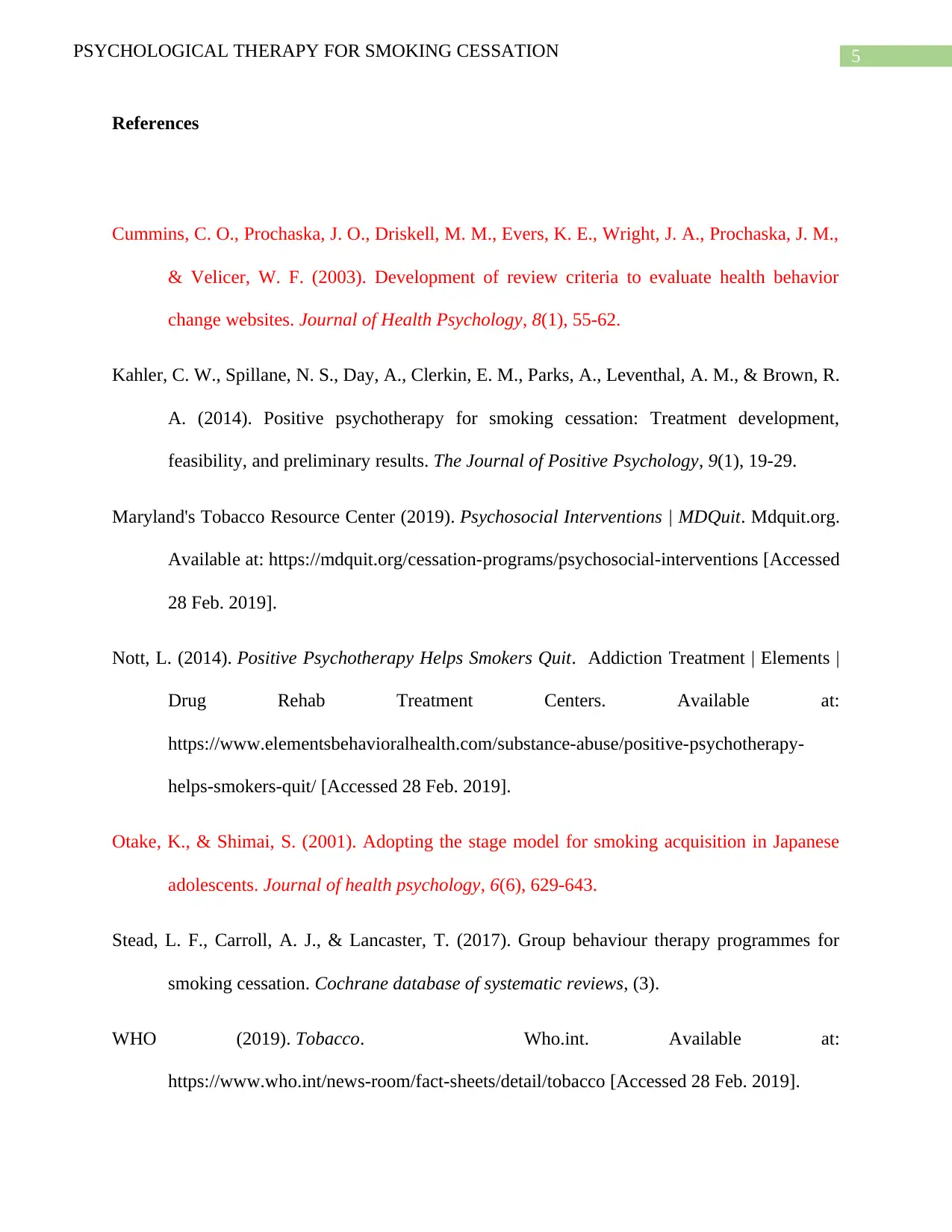
5PSYCHOLOGICAL THERAPY FOR SMOKING CESSATION
References
Cummins, C. O., Prochaska, J. O., Driskell, M. M., Evers, K. E., Wright, J. A., Prochaska, J. M.,
& Velicer, W. F. (2003). Development of review criteria to evaluate health behavior
change websites. Journal of Health Psychology, 8(1), 55-62.
Kahler, C. W., Spillane, N. S., Day, A., Clerkin, E. M., Parks, A., Leventhal, A. M., & Brown, R.
A. (2014). Positive psychotherapy for smoking cessation: Treatment development,
feasibility, and preliminary results. The Journal of Positive Psychology, 9(1), 19-29.
Maryland's Tobacco Resource Center (2019). Psychosocial Interventions | MDQuit. Mdquit.org.
Available at: https://mdquit.org/cessation-programs/psychosocial-interventions [Accessed
28 Feb. 2019].
Nott, L. (2014). Positive Psychotherapy Helps Smokers Quit. Addiction Treatment | Elements |
Drug Rehab Treatment Centers. Available at:
https://www.elementsbehavioralhealth.com/substance-abuse/positive-psychotherapy-
helps-smokers-quit/ [Accessed 28 Feb. 2019].
Otake, K., & Shimai, S. (2001). Adopting the stage model for smoking acquisition in Japanese
adolescents. Journal of health psychology, 6(6), 629-643.
Stead, L. F., Carroll, A. J., & Lancaster, T. (2017). Group behaviour therapy programmes for
smoking cessation. Cochrane database of systematic reviews, (3).
WHO (2019). Tobacco. Who.int. Available at:
https://www.who.int/news-room/fact-sheets/detail/tobacco [Accessed 28 Feb. 2019].
References
Cummins, C. O., Prochaska, J. O., Driskell, M. M., Evers, K. E., Wright, J. A., Prochaska, J. M.,
& Velicer, W. F. (2003). Development of review criteria to evaluate health behavior
change websites. Journal of Health Psychology, 8(1), 55-62.
Kahler, C. W., Spillane, N. S., Day, A., Clerkin, E. M., Parks, A., Leventhal, A. M., & Brown, R.
A. (2014). Positive psychotherapy for smoking cessation: Treatment development,
feasibility, and preliminary results. The Journal of Positive Psychology, 9(1), 19-29.
Maryland's Tobacco Resource Center (2019). Psychosocial Interventions | MDQuit. Mdquit.org.
Available at: https://mdquit.org/cessation-programs/psychosocial-interventions [Accessed
28 Feb. 2019].
Nott, L. (2014). Positive Psychotherapy Helps Smokers Quit. Addiction Treatment | Elements |
Drug Rehab Treatment Centers. Available at:
https://www.elementsbehavioralhealth.com/substance-abuse/positive-psychotherapy-
helps-smokers-quit/ [Accessed 28 Feb. 2019].
Otake, K., & Shimai, S. (2001). Adopting the stage model for smoking acquisition in Japanese
adolescents. Journal of health psychology, 6(6), 629-643.
Stead, L. F., Carroll, A. J., & Lancaster, T. (2017). Group behaviour therapy programmes for
smoking cessation. Cochrane database of systematic reviews, (3).
WHO (2019). Tobacco. Who.int. Available at:
https://www.who.int/news-room/fact-sheets/detail/tobacco [Accessed 28 Feb. 2019].

6PSYCHOLOGICAL THERAPY FOR SMOKING CESSATION
1 out of 7
Related Documents
Your All-in-One AI-Powered Toolkit for Academic Success.
+13062052269
info@desklib.com
Available 24*7 on WhatsApp / Email
![[object Object]](/_next/static/media/star-bottom.7253800d.svg)
Unlock your academic potential
© 2024 | Zucol Services PVT LTD | All rights reserved.





